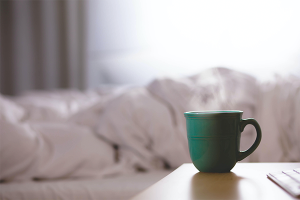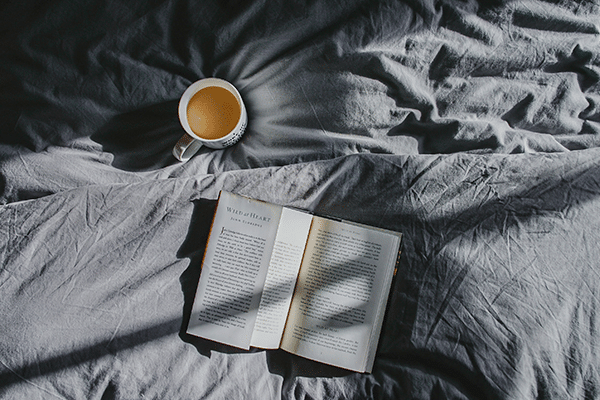With insomnia affecting one-third of the adult population in the United States, it’s no wonder so many people are looking for natural sleep aids to help them get a good night’s sleep. So can you use tea for sleep?
Research shows that as many as 30-40% of adults struggle to fall and stay asleep each night (1). And chronic sleep problems are most severe in older adults (25%) and those with medical conditions (69%) (1).
The best bedtime tea may help you relax and ease into a healthy sleep routine. And unlike something like melatonin, which has a sedative effect in some people but not everyone, different types of tea provide different ways to help your body usher in good sleep naturally.
Hopefully, this article about the best teas for sleep will help!
What Kind of Tea Helps You Sleep?
Most of us already know not to consume caffeinated beverages (like coffee) too close to bedtime, but sometimes we’re confused by tea.
Teas made from leaves off the Camellia sinensis plant, such as black tea and green tea, contain the calming amino acid l-theanine. This helps counteract the jolt of caffeine to your system and produces a relaxing effect.
But even with l-theanine, it’s best to reserve these teas for your morning brews because they still contain caffeine. Black teas have higher caffeine levels (similar to coffee), while green tea comes in at the lower end of the spectrum.
So what’s the best type of tea for sleep? Herbal tea, also known as a tisane.
Herbal teas come from plants, leaves, and flowers outside of the Camellia sinensis family. These specific herbal teas are naturally caffeine-free and great for helping you relax and de-stress before bed.

The Top 7 Best Teas to Help You Sleep
Reach for these teas when you want the best sleep:
1. Lavender Tea
Lavender essential oil is most often used to help lower stress levels and help you relax. When these pretty purple flowers are infused as a tea, lavender can be just as beneficial for your sleep hygiene.
One study in Taiwan examined the effects of drinking lavender tea in 80 postnatal mothers. Researchers learned that drinking one cup of lavender tea per day for two weeks supported better sleep quality, reduced fatigue, and helped strengthen the bond between mother and baby (2).
Besides drinking the tea, the study participants were also asked to slow down and savor the tea’s aroma to really feel the lavender’s calming effects.You may score these positive side effects when you enjoy a relaxing cup of lavender tea too. But skip the tea bags and messy loose leaf options: our stress- and caffeine-free lavender reishi latte is as calming as it is delicious and easy to make.
2. Chamomile Tea
Chamomile flowers look like daisies and make one of the most popular caffeine-free tea options for unwinding and relaxing. And chamomile tea contains a powerful flavonoid compound called apigenin, which acts on the brain’s GABA receptors to promote a feeling of calmness.
Low doses of chamomile act like a mild tranquilizer and produce a soothing effect on the nervous system. Higher doses of chamomile behave more like a sedative, helping to promote calm and better sleep.
Researchers from a Taiwanese study examined the effects of chamomile tea on postnatal women with poor sleep quality. In a similar fashion as the lavender study mentioned, the women were told to drink one cup of chamomile tea per day for two weeks.
After the trial period, the women reported that the tea significantly lowered their physical symptoms of sleep deprivation. Researchers noted the chamomile may have also supported a more balanced mood (3).
Thanks to chamomile tea’s calming effects, it makes a fantastic option if sleep troubles are currently plaguing you. It may even help with night time indigestion or heartburn (4).
3. Passionflower Tea
Most people aren’t as familiar with drinking passionflower tea as they are with drinking lavender or chamomile tea for better sleep. However, this calming tea may support improved sleep quality and reduced insomnia, so it’s worth putting on your radar.
A small double-blind, placebo-controlled repeated-measure study had participants drink a cup of tea per day while keeping track of the effects they noticed in a sleep diary. During the trial, participants reported significantly higher sleep quality. Researchers noted that even a low dose of passionflower tea was enough to see these positive effects (5).
4. Lemon Balm Tea
Lemon balm is an herb in the mint family with subtle citrus and minty flavors. Unlike spearmint tea, which can boost your energy levels, lemon balm tea is a calming option that works like chamomile tea.
Since it may positively stimulate GABA receptors, it’s been shown to support better sleep, higher moods, and lower stress levels.
5. Low-Caffeine Green Tea
While caffeinated tea is usually something you want to avoid if you’re having sleep issues, there is one surprising exception to the rule in low-caffeine green tea. When consumed early enough in the day, low-caffeine green tea supported better sleep quality and lower fatigue levels in study participants.
Researchers compared low-caffeine green tea with regular green tea consumption using a double-blind crossover study. They gave participants a cup of tea each day for seven days with a single washout period.
The results showed that participants who drank the low-caffeine green tea earned better sleep and experienced less tiredness the next day than those in the standard green tea control group (6)(7).
Our favorite low-caffeine green tea happens to be Mint Green Tea Crystals.

Pique Mint Green Tea
A cool breeze of catechins. Refreshing and invigorating. A delicious way to feed your gut bugs.
6. Valerian Root Tea
Drinking valerian root tea for relaxation has been popular in European countries for decades. However, it’s not commonly used here in the United States.
While research is limited, one review of 16 studies with over 1,000 participants demonstrated that valerian root tea may support improved sleep quality and help induce sleep (8). Although more research is needed to prove these points further, six out of the 16 studies showed statistically significant benefits for rest without any adverse side effects.
7. Magnolia Tea
Magnolia tea may also be a less-familiar option for sleep. But when researchers studied the effects of magnolia tea on postpartum women struggling with sleep and symptoms of depression, they saw improvements in both after just three weeks (9).
These positive side effects didn’t interfere with the mother’s ability to care for her infant at night or cause any daytime dysfunction. What’s even more interesting is that the researchers discovered that magnolia tea’s beneficial effects lasted longer than those caused by drinking chamomile tea, which is a go-to for many people.
So the next time you’re looking for a sleepy tea, you may want to give magnolia tea a shot over chamomile.
Other Herbal Teas Worth Noting for Better Sleep
As we mentioned in our guide on calming teas, the following options may also be beneficial nighttime brews for sleep. However, there’s not enough research right now to draw definitive conclusions:
- Lemongrass tea
- Peppermint tea
- Licorice root tea
- Tea made from rose petals
- Hibiscus tea

Pique Hibiscus Beauty Elixir
Like a rosy-cheeked glow that’ll have you feeling flirty. Revitalizing and caffeine-free. Make your cells dance.
Is It Good to Drink Tea Before Bed?
No matter which tea you choose, you shouldn’t drink your cup too close to bedtime. This may cause you to wake up and use the restroom in the middle of your sleep cycle. Nighttime wake-ups like these disrupt your sleep quality and cause next-day drowsiness — even if you’re sticking to a sleep tea from this list.
If you’re choosing the low-caffeine green tea route, remember this still contains a bit of energy. So you should drink this one before noon. Then, switch to one of the herbal teas on this list after lunch.
You may want to enjoy our calming reishi lavender latte in the afternoon before dinner (or post-dinner if you like to eat early and a few hours before bed). It will help you wind down for the evening without compromising your sleep.
Final Thoughts on the Best Teas for Sleep
If you’ve made it to this point in our guide, you now have seven delicious and relaxing teas to choose from if you’re struggling to fall asleep or clock enough restful sleep. Experiment with different types to see which work best for your body.
As long as you enjoy these sleep teas well before you head to bed, you’ll be able to reap their calming effects without disrupting your sleep or feeling drowsy the next day.
For more tips on getting better sleep, visit our guide on deep sleep next!







